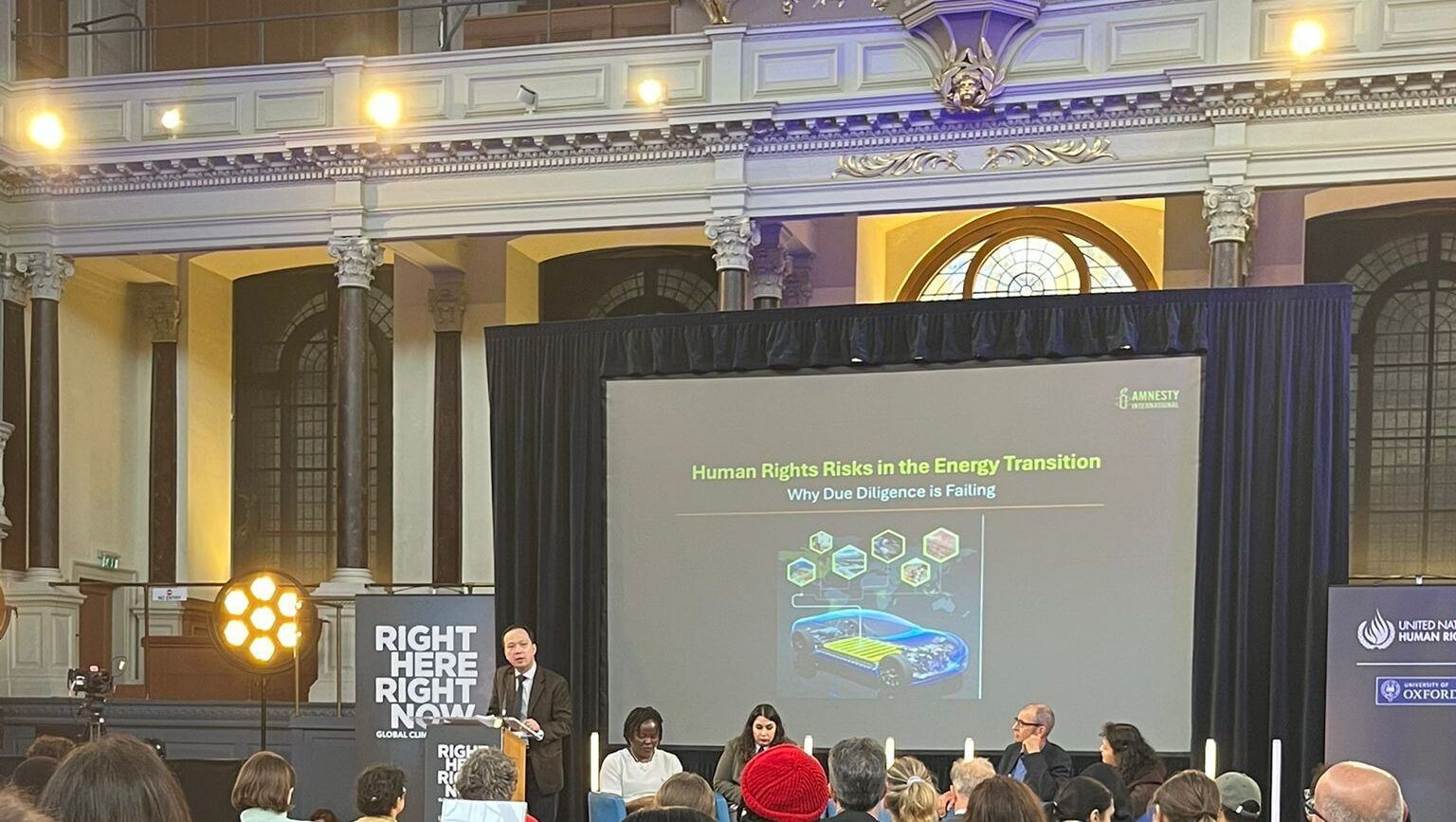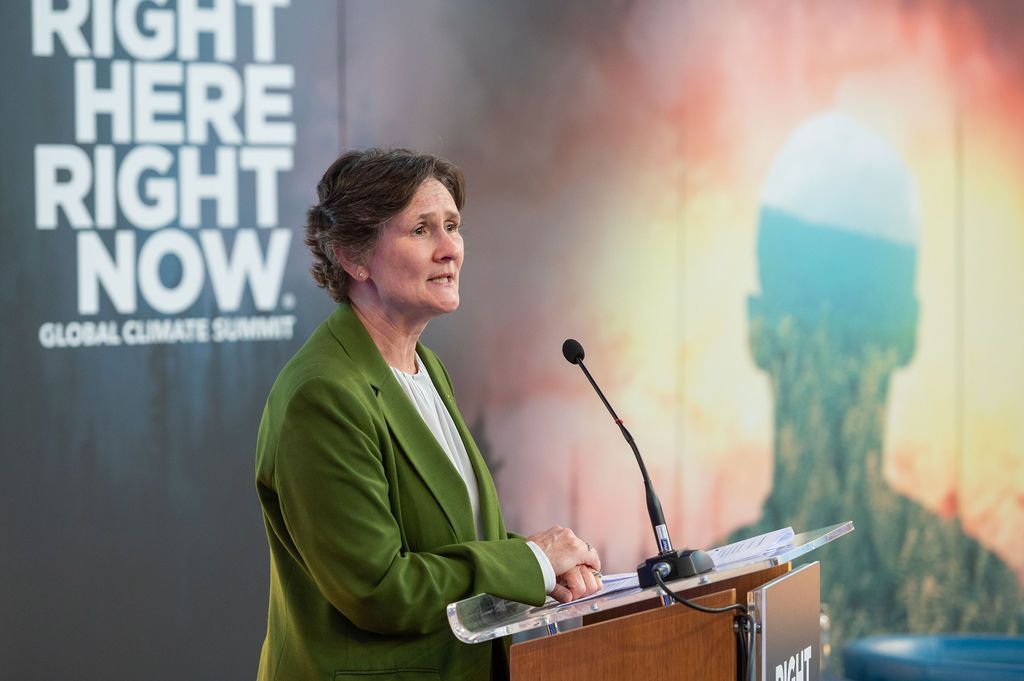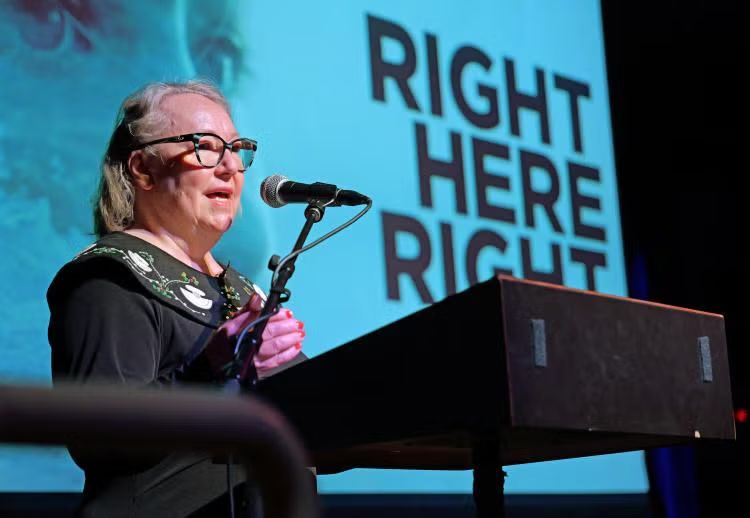Right Here, Right Now: Global Climate Summit comes to Oxford

Right Here, Right Now is a global climate summit bringing together leading thinkers and practitioners at the intersection of climate change and human rights for a 24-hour global academic plenary broadcast live across time zones. This year, hosted by the University of Oxford, the summit centred around 5th June, UN World Environment Day, with events lasting from the 2nd – 8th June. The events include a “Party for the Planet” on Broad Street, an Ellie Goulding concert, and a late night at Oxford’s Pitt Rivers Museum, as well as talks and seminars hosted across the city. At 8pm BST (or 7pm UTC) on 4th June, the summit was launched in Oxford, with a welcome by Vice-Chancellor Irene Tracey and UN High Commissioner for Human Rights Volker Türk. At 10pm, it began its tour around the world, starting with The University of the South Pacific for a panel on climate change in the Pacific and youth perspectives on climate justice. It was 1pm (BST) the next day, 15 hours in, by the time the summit returned to Oxford’s Sheldonian Theatre, for three panels under the title of Beyond Borders: Human Rights in a Changing Climate.
Dr. Alice E. A. Evatt moderated Oxford’s portion of the summit (a task which included the frequent ringing of a bell to keep speakers to time). She emphasised her department’s research: net zero. Introducing the themes of the session, she noted that recently companies have had more rights than the environment, and more rights than individuals, as well as the power to enforce their will. She summed this up in a single word: “perverse.” Speaking as a representative of the University, she noted that universities across the globe have a responsibility to bring human rights to the fore.
The first panel was entitled Human Rights in Climate Action: The Transformative Power of Law. The panel consisted of Professor Lavanya Rajamani (Faculty of Law, University of Oxford), Professor Elisa Morgera (UN Special Rapporteur on the promotion and protection of human rights in the context of climate change), Professor Ekaterina Aristova (Bonavero Institute of Human Rights, University of Oxford), as well as Nele Schuldt from the Oxford Sustainable Law programme, and Oxford Human Rights Student Society Co-President, Joshua Hess.
Professor Rajamani began the panel by talking about the Paris Agreement, acknowledging that without it, we would not be on our current track. She then explained that the Paris Agreement has reached the limits of what it can deliver by itself. Finances are falling short, and more needs to be done. She explained that human rights is essential in a climate context because it takes us away from the self interest of states, and puts the focus on people and on the planet. Human rights is included in states’ responsibilities, even where sustainability is not. Rajamani closed by calling for remedies for climate harms, and also called for climate justice and greater human rights protections.
Professor Elisa Morgera began by explaining the transformative potential of human rights in discussions surrounding climate change: through a focus on human rights, states can be convinced to put humanity on a safer path by prioritising a safer climate. She then deplored the fact that the systemic root causes of climate change have not been front and centre in discussions of climate change, and this is because those systemic causes are protected by powerful industries. The fossil fuel industry is related to almost every aspect of climate change: plastic production, petrol, air pollution, water pollution through extraction of waste products, global warming, and the displacement of Indigenous populations, to name just a few. By looking at climate change through the lens of human rights, a focus has been placed on the fossil fuel industry as the root cause of climate change, as well as the impact of the fossil fuel industry on economies and individuals’ lives. Professor Morgera then explained that climate change may be global, but its effects are disproportionate: women, children, and those with disabilities are most affected, and certain states are more affected than others. It is with this in mind that we should think about what measures will be most effective in the fight against climate change. Morgera lamented that 10% of the richest people in our societies have the power and finances to mitigate climate change, but instead choose to contribute to and benefit from it. She called on states to regulate the private sector in order to limit climate change, saying that they have an international obligation to fight climate change in ways which go beyond those laid out in the Paris Agreement. She closed by calling for justice for climate change activists who have been attacked or killed for speaking up, and called for climate based solutions to protect the most vulnerable groups across the globe.
Professor Ekaterina Aristova said that the fossil fuel industry has been aware of its environmental impacts as early as 1954, and noted that whilst the Paris Agreement has been influential, it does not impose restrictions on private actors. She commended the UN Guided Principles on Business and Human Rights for extending to apply to climate change in 2023, as part of a more global recognition that climate change has immediate (as well as long-term) impacts on human life. She hoped that this would fundamentally reshape how businesses operate: whereas previously use of water was not recognised as problematic, she hoped that there would now be the recognition that this would restrict or affect the water of local communities. She commended the law for finally beginning to catch up with science. She closed with a hopeful remark: the business should, with new legal guidance, be able to better identify risks and build trust with stakeholders (i.e. local communities).
Joshua Hess ended the panel with a remark that we need a shift to view climate and environmental issues as inseparable from human rights issues.
The second panel was entitled Unearthing Injustice: Human Rights and the Business of Extraction. The panel featured Dr Jessica Omukuti (Oxford Net Zero, University of Oxford), Dr Samira Barzin (Environmental Change Institute, University of Oxford), Phil Bloomer (Business & Human Rights Resource Centre), Quynh Le Tran (Amnesty International), and Katya Narendratanaya (MSc student, University of Oxford).
The panel began with Dr Samira Barzin, who said “today I am just Samira” – a fellow individual. As the daughter of an immigrant, she spoke about uncovering the invisible. She explained that she became an economist because she wanted to understand the root causes of injustice. Throughout her speech, which focused mainly on mining practices, she emphasised our role in the system: as individuals, as consumers, as members of this University. She asked the students in the Sheldonian: what is the world that you want to live in? As much as climate activism is about power dynamics, it is also about those of us who make up the system. She called for everyone to think about “what can you do right here, right now.”
Quynh Le Tran lamented that due diligence is failing within private industries. He explained that there is no independent verification, and that most companies rely on self-reporting, which is doomed to be ineffective. Even third party audits lack transparency. He also noted ineffective grievance mechanisms, and that communities currently lack real access to remedy. He said that community rights are often overlooked: that Indigenous and local rights exist in policy, but not in practice. He then lamented the weak enforcement of policies — that voluntary commitments dominate, and actual laws are rarely robust or fully enforced. He called for better policies within a corporate context.
Phil Bloomer outlined his transitional mineral tracker, which helped to show that Indigenous peoples are four times as likely to be affected by mining industries, since those in power view them as expendable, and they are also more likely to be on land with greater natural resources. Bloomer emphasised the building of shared prosperity, and importance of fair negotiations. He said that fast energy transition requires that the transition is fair, and that human rights must be at the core of all mineral change. We need smart regulation and business incentives to ensure shared prosperity and fair negotiations — bad companies only change when they face legal fines and consequences for their actions. He concluded that smart regulation accelerates, not slows, innovation and transition. He also called for a public opinion strong enough to counter the voices of corporations in politicians’ ears.
Dr Jessica Omukuti closed the panel by urging listeners to think about where they spend their money, and think about where it goes. To ensure that it is not worsening human rights around the world.
The third panel was entitled At The Frontlines: The Intersection of Climate Change, Conflict and Human Rights. The panel featured Andrew Gilmour (former UN Assistant Secretary-General for Human Rights), Michael Phoenix (Head of Research and Campaigns, supporting the UN Special Rapporteur on the situation of human rights defenders), Dr. Shruti Nath (Postdoctoral Research Associate, University of Oxford) and Tabina Manzoor (Margaret Thatcher Scholar, University of Oxford).
Andrew Gilmour opened the panel by explaining that the intersections between climate change, conflict, and human rights is a new concept. There is a (slowly) growing understanding that climate change is the greatest threat to human rights ever envisaged. He also explored the double tension of human rights violations being the result of conflict, whilst simultaneously conflict is often a result of human rights violations and climate change. He continued that climate change can exacerbate tensions in a myriad of ways: it makes conflict more likely, more complicated, and harder to resolve, often involving tensions surrounding finite resources. Deprivation is also a factor in radicalisation: there is evidence that droughts often lead to recruits for terror groups. Gilmour closed with the reflection that Darfur was the first genocide of the 21st century, and it was also the world’s first climate war.
Michael Phoenix opened by acknowledging that climate change is a major human rights crisis, and that climate justice is about defending human rights for all. He discusses multiple examples of people in conflict zones combatting and/or monitoring climate change, even when it puts them at risk, for example climate activists in Afghanistan, who had to flee the country in 2021. Phoenix invited us to question who profits from this? Who profits from conflict? Who profits from the expansion of fossil fuels? When atrocities happen, someone is profiting. He closed by saying that universities, including Oxford, have investments in the companies that profit from this.
Dr Shruti Nath began by saying that climate change is multi-faceted. She repeated Gilmour’s assertion that climate change — and a lack of resources caused by climate change — leads to conflict. She also noted that conflict takes away the resources of a state to deal with climate effects, like drought or flooding. Three of the most compelling statements she made were that climate change does not respect borders, saving lives after a disaster is far harder than protecting them with preventative measures, and 50% of disasters were predictable ahead of time.
The conversation then turned back towards Michael Phoenix, who commended those universities which have already set up shelter programmes. He called on universities to take steps towards divestment from fossil fuel companies and arms companies. He emphasised that we need actions, not words.
Andrew Gilmour continued by expressing that he would like for climate finances to go to less stable or less developed states, or states which are in conflict, noting that at the moment almost all climate finances go to relatively stable states.
Benjamin Schachter, Human Rights Officer and Environment team leader at United Nations Human Rights, offered some closing remarks. He said that it has been thrilling to see the engagement in Oxford and how that’s been replicated across the UK. He said that climate change affects peoples’ rights every day: massively and terribly, but that this can be stopped. In uncertain times, human rights must be our compass. He called for solidarity, empathy, peace and rights.
Oxford’s own Alexis McGivern and Valery del Carmen Salas Flores offered closing remarks, before the conference moved to the Americas. They emphasised that we must hold our own institutions accountable, especially when it comes to divestment, and again emphasised that delivering climate justice means delivering human rights for all. They called for international solidarity. They acknowledged the extreme gap between wealth and poverty, and also gaps in access. The climate compounds existing issues, including poverty, gender inequalities, and colonial legacies. They acknowledged the difficulty in envisioning another way of living. They also recognised the multilevel trust deficit: climate negotiations have been going on for decades, but action has been hesitant, and so it is understandable that there is mistrust in the ability for cooperative change. There is no easy answer: this is a complex crisis, but there are things we can do.
The pair continued by explaining potential solutions. We must ensure that all actors are recognised and invited to the table, including local communities. We must be honest with ourselves. They closed by emphasising that we need to move beyond a human-centric lens, and understand the rights of the ecosystem.
Myles Allen, a professor at Oxford, and the husband of Vice-Chancellor Irene Tracey, used the spare time allotted to Oxford for a final call for the greater union of universities.
At 9:30pm (BST) on 5th June, the 24-hour summit ended at the UN Human Rights, with some closing reflections and a call for human rights-based climate action: right here, right now.
Share this post:
Additional Recent News








